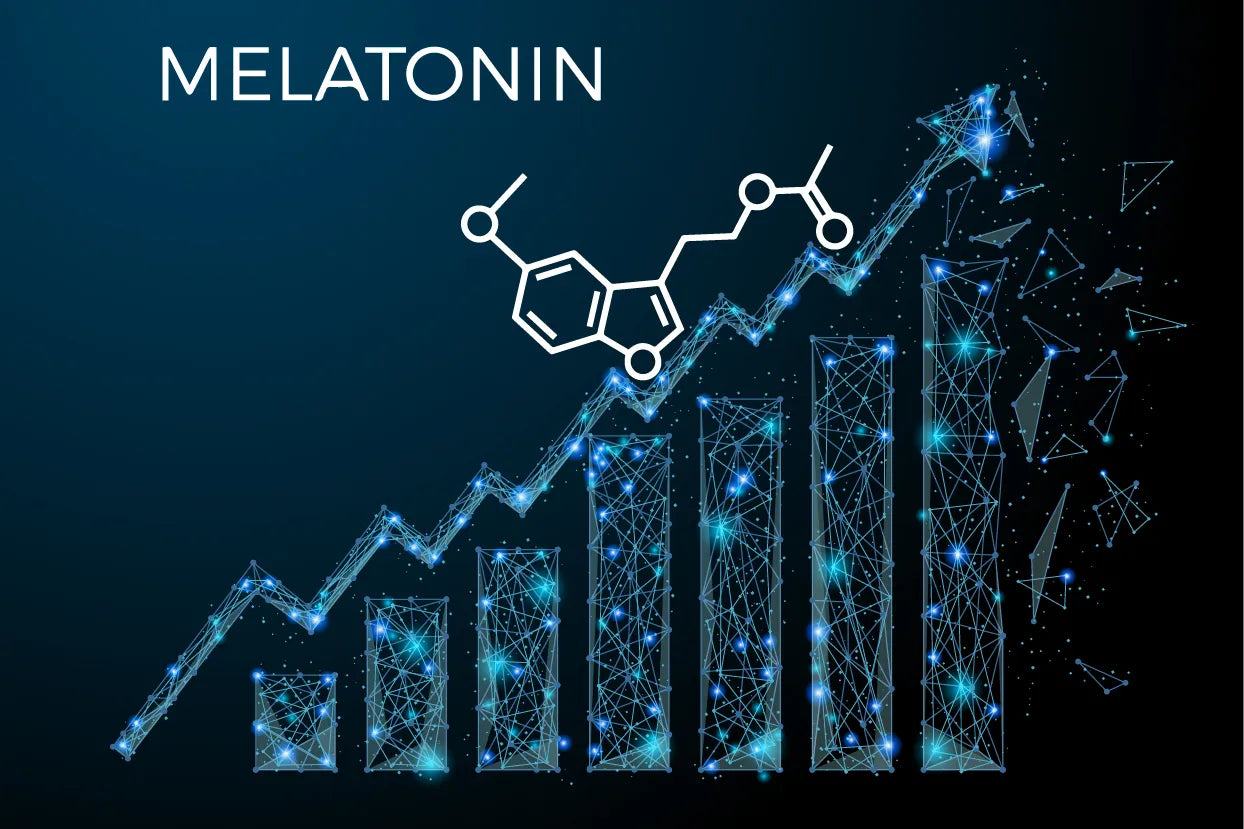Ever wished you could actually "sleep like a baby"?
Most 1- to 3-year-olds have super-high melatonin levels! That’s why young children sleep so much and so soundly. Thereafter, melatonin levels plummet by 80% throughout childhood.[1]
Beyond childhood, melatonin levels continue to drop even more throughout life. By the time you reach your 60s or 70s, you're getting pretty low levels.
That's started some physicians and scientists thinking about whether more adults could benefit from higher doses of melatonin, especially when dealing with serious diseases.
Many studies support the efficacy of low and moderate doses of melatonin for its sleep effects. Unfortunately, there are fewer studies that have looked at long-term effects of high doses.
Here’s what we know so far…

Melatonin’s Growing Popularity
Melatonin has become a popular sleep supplement, known as a chronobiotic.
However, research over the past decade has established melatonin as a player in many health issues, including cancer, Alzheimer’s disease, MS, fertility, PCOS, and more. During Covid-19, it was used as an immune-active agent and mitochondrial regulator.[2]
There are some interesting similarities between melatonin and vitamin D regarding their scope of impact on health, leading some people to predict that melatonin will become the “next vitamin D.”
Both substances act as hormones, both affect multiple organ systems, both are found in the skin, and both are responsive to sunlight and darkness.
There’s been widespread concern about vitamin D deficiency as a “sunlight deficiency.” Now there’s growing concern about reduced melatonin secretion creating a “darkness deficiency” from widespread overexposure to artificial blue light.

Melatonin and Your Immune System
Aging is linked with decreased immune function (immune-senescence), which is why cancer and other chronic diseases are more common in the elderly. All parts of the immune system tend to deteriorate with age.
Melatonin stimulates the production of progenitor cells (similar to stem cells) for granulocytes and macrophages.
Granulocytes are a type of immune cell that includes neutrophils, eosinophils, and basophils. Macrophages are a type of white blood cell that surrounds and kills microorganisms, removes dead cells, and stimulates other immune system cells.
In addition, melatonin stimulates production of natural killer (NK) cells and CD4+ cells.
NK cells are immune cells with enzymes that kill tumor cells or virus-infected cells. CD4+ cells carry out many functions, including activation of the innate immune system cells and suppressing the immune reaction.

Melatonin and Cancer
Some people use melatonin as an adjunct therapy to help fight cancer.
There’s good reason for that. Go to https://pubmed.com and enter the search term “melatonin and cancer,” and you’ll get 3,583 published studies (as of this writing)! All investigating the potential role of melatonin as an adjunctive therapy.
Melatonin has been shown in trials to help patients with a variety of cancers, including primary brain tumors, non-small-cell lung cancer, breast cancer, prostate cancer, colorectal cancer, skin cancer, liver cancer, cervical cancer, ovarian cancer, and brain metastases, in doses up to 40 mg daily.
Melatonin works well with conventional treatments.
Two different reviews of melatonin use during chemotherapy or radiation treatments showed it decreased the therapies’ negative side effects such as fatigue and low platelet counts. It also improved sensitivity to the treatment and increased one-year survival rates.[3, 4]
The combination of melatonin with conventional drugs improves the drug sensitivity of treatments in both solid and liquid tumors.[5]
Melatonin exhibits a wide range of benefits against cancer by inducing apoptosis, halting proliferation, and inhibiting metastasis.[5]

Melatonin and Rheumatoid Arthritis
Preliminary research suggests that melatonin may increase the severity of rheumatoid arthritis (RA), in stark contrast to its beneficial effects in other autoimmune diseases.[6]
But the evidence seems to be mixed. Some studies show that low-dose melatonin (<10 mg) doesn’t seem to cause harmful effects in individuals with autoimmune diseases, such as MS, ulcerative colitis, lupus, and IBS. [7-13]
Some studies also show melatonin is helpful for RA because it inhibits certain inflammatory factors. A 2021 study found that 6 mg per day of melatonin for 12 weeks improved many disease markers in RA patients.[14]
Speak with your doctor if you’re considering using melatonin and have RA. Using under 10 mg may be considered by your physician.

Melatonin and Alzheimer’s Disease (AD)
Aggregation of Amyloid (A) plaques or neurotoxic A oligomers in the brain is a telltale symptom of AD development.
Melatonin shows a strong neuroprotective effect that can prevent or slow the progression of AD. [15]
PubMed contains some 680 published studies about this relationship, if you want to investigate further.

How Much Melatonin Should You Take?
That’s the $64,000 question! And something you should involve your holistic practitioner in deciding.
Integrative doctors have traditionally erred on the side of caution about melatonin amounts, and therefore tend to recommend low levels.
Fortunately, a surprising number of human studies have been done using varying melatonin doses – with no serious side effects noted.
High doses of melatonin (50 mg or more) have been used in preclinical and clinical settings. Even at these high doses, it shows a good safety profile and improved disease outcomes.
What we’re lacking is long-term studies that reveal whether there’s harm from long-term use, especially at those high levels.

What the Short-Term Studies Say About How Much Melatonin
An analysis of 50 studies about 1-20 mg of melatonin showed that adverse events were minor and transient. When taken during the day, fatigue was the most common side effect.
In a study of just five adults, they administered 1,000 mg per day for 25-30 days. The biggest reported side effect was drowsiness. There were no severe or irreversible clinical impacts on blood pressure, heart rate, ECG, serum blood levels, or urine analysis from this massive dose.[16]
Three separate studies using high doses of melatonin also found no adverse side effects:
-
90 mg – intravenously administered to healthy individuals as well as individuals with Parkinson’s disease and seizure disorder.[17]
-
100 mg in healthy individuals intravenously.[18]
-
10 mg/kg administered intravenously in preterm infants and septic neonates.[19]
These studies suggest that melatonin is safe, even in high doses.
Do keep in mind that these are short-term studies. We don’t recommend using such high doses except under the care and guidance of your physician.
Don’t hold your breath waiting for long-term studies on high doses of melatonin either. Who’s going to pay for such a trial when the product is an inexpensive dietary supplement that’s been around for several decades?

Mixing Melatonin and Prescription Drugs
Melatonin is known to interact with various medications, including blood thinners, sedatives, antidepressants, and more. Melatonin can also affect blood pressure. You should always discuss the use of new supplements with your holistic practitioner for their medical advice before beginning.

Don’t Talk with Your Conventional Doctor About This!
If you ask your conventional doctor about melatonin, you’re likely to get a stern warning about “self-administered” melatonin and “safety concerns” and “insufficient study of people taking daily doses of 5 mg.”
They’re about 30 years behind the times. If it was so dangerous, people would’ve been harmed by now.
Plus, there’s highly compelling evidence for the use of melatonin in cancer. Go to PubMed and see for yourself.
Again, find a good holistic practitioner and speak with them about what he or she recommends.

FAQs:
What does melatonin do to help you sleep?
Melatonin is a hormone naturally produced by the pineal gland. It helps regulate your sleep-wake cycle and signals to your body that it’s time to wind down, promoting drowsiness and helping you fall asleep more readily.
When is the best time to take melatonin for better sleep?
The best time to take melatonin is 30 to 90 minutes before bedtime. This lets it align with your natural circadian rhythm.
How much melatonin should you take to fall asleep faster?
Most adults benefit from a low dose of 0.5 to 3 mg, which is often as effective, if not more effective, than higher doses.
Is it safe to take melatonin every night?
Melatonin is generally considered safe for short- to moderate-term nightly use, especially at low doses. But you should always discuss with a healthcare provider, especially if you take medications or have underlying conditions.
Why doesn’t melatonin work for everyone?
Melatonin may not work for everyone due to timing issues, individual sensitivity, or underlying sleep disorders. It works best for circadian rhythm-related issues.
How does melatonin support immune function?
Melatonin enhances immune function by modulating inflammatory cytokines, shoring up antioxidant defenses, and regulating immune cell activity. It also helps reduce oxidative stress, which weakens immunity.
Can melatonin reduce the side effects of chemotherapy or radiation?
Yes, studies suggest melatonin may help reduce fatigue, improve sleep, and protect healthy cells from damage during chemotherapy or radiation. It may also enhance treatment tolerance. It should only be used under medical supervision during cancer care.





Share:
More Deadly than Sugar, But You Likely Eat It Every Day
What Recent Studies on Curcumin Say